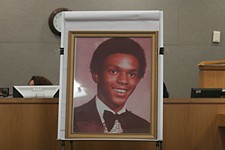Targeting Wrongful Convictions
Bills attempt to right the wrongs that put Texas at the forefront of wrongful convictions
By Jordan Smith, Fri., April 17, 2009
On April 8, Rep. Pete Gallego, D-Alpine, rounded up all of the members of the House Committee on Criminal Jurisprudence to cast votes on House Bill 498, by Rep. Ruth Jones McClendon, D-San Antonio, which creates an Innocence Commission to investigate each of Texas' growing number of wrongful convictions. With all 11 cats herded into the room, the measure passed out of committee on a vote of 8-3, with the usual suspects – including Reps. Debbie Riddle, R-Tomball, and Wayne Christian, R-Center – voting against.
Proposed several sessions in a row, the measure tasks an Innocence Commission with identifying the causes of wrongful convictions and ways to prevent them – as it stands, Texas has the dubious honor of leading the country in convicting the innocent. To date, 38 men have been exonerated in Texas after spending a total of more than 400 years in prison.
Family members of Timothy Cole gathered for the vote. Cole died in prison in 1999 after serving 13 years for a 1985 rape in Lubbock. DNA evidence has since proven him innocent of the crime, and he was formally exonerated after a February hearing in the Travis Co. District Court of Judge Charlie Baird. It was the state's first posthumous exoneration. (Cole's family is now working with Gov. Rick Perry to secure a posthumous pardon. Jeff Blackburn, chief counsel for the Innocence Project of Texas, says that there are still details to be worked out, but he's "confident we'll get there.")
In his strongly worded opinion, Baird concluded that Lubbock police developed "tunnel vision" in the case against Cole, ignoring – and even destroying – evidence that strongly suggested they had the wrong man. Baird said the photo lineup administered by police was biased and that police manipulated the tentative identification of Cole made by rape victim Michelle Mallin to make it seem that she was positive he was her attacker.
Baird called on Texas lawmakers to fix the flaws in Texas' criminal justice system made glaringly obvious by Cole's wrongful conviction. "Under our form of government, a Court can only adjudicate the case before it," he wrote. "It is up to the legislative branch to make laws that improve our system and ensure results that are both reliable and worthy of public confidence." Lawmakers should mandate the use of "fair practices" in eyewitness identification, ensure access to courts by prisoners with claims of actual innocence (especially in cases "where there is a solid claim based on newly discovered or established scientific evidence"), and improve laws that provide compensation for exonerees and their survivors "for the devastating wrong done to them."
Bills proposing changes in each of these areas are making their way through the Legislature. One that would require police to adopt policies for conducting live and photo lineups has passed out of the Senate Committee on Criminal Justice (Senate Bill 117, by Sen. Rodney Ellis, D-Houston), as has another measure (SB 1976, by Sen. John Whitmire, D-Houston) that would expand post-conviction access to courts by inmates based on actual innocence. A third measure – Dallas Democrat Rafael Anchia's HB 1736, the so-called Tim Cole Compensation Act (carried by Lubbock Republican Sen. Robert Duncan in the Senate) – would increase compensation for the wrongfully convicted and allow those benefits to pass to family members in the event of a death before release from prison. It is still pending in the House Committee on Criminal Jurisprudence.
After the votes were cast on HB 498, Christian turned up his mic to let the Cole family know that the votes against the measure, including his own, had nothing to do with the feelings of lawmakers about the fate of their son. Certainly the Cole's family situation is "horrible, and we totally support you," he said. There was "no excuse" for what happened to Timothy Cole, he added, and the family should know that "our opposition don't have nothing to do with our respect for your situation."
Thanks. Thanks a lot. Amazingly, Riddle, not known for holding her tongue, did so this time. For that, perhaps, there is thanks.
The bill now moves to the full House for consideration. And, McClendon said, Perry has promised the family that if the bill makes it to his desk, he will sign it.
Got something to say on the subject? Send a letter to the editor.











